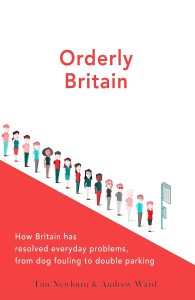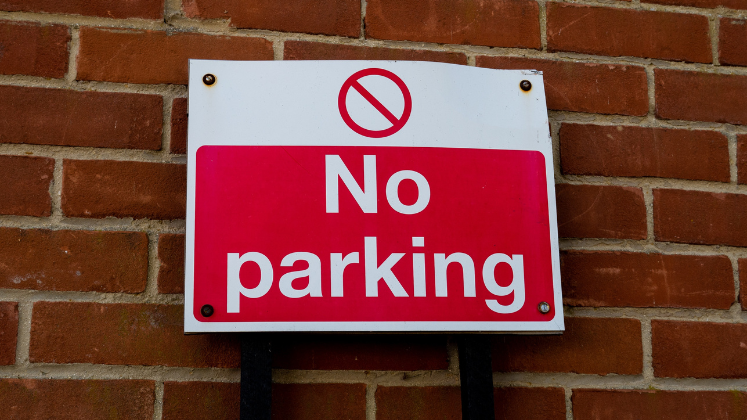In Orderly Britain: How Britain Has Resolved Everyday Problems, from Dog Fouling to Double Parking, Tim Newburn and Andrew Ward explore how ordinary social behaviours – including queuing, drinking and smoking – and their regulation evolved in post-war Britain. Though the authors’ aim to eschew ‘big’ history from their analytical framework is somewhat flawed, Nicholas Accattatis nonetheless finds the book a rich analysis of the complex shifts in Britain’s social order over time.
Read an interview with Tim Newburn about Orderly Britain conducted in 2022 for LSE Review of Books.
Orderly Britain: How Britain Has Resolved Everyday Problems, from Dog Fouling to Double Parking. Tim Newburn and Andrew Ward. Robinson. 2022.
 When one observes the tumultuous scenes within the House of Commons during Prime Minister’s Questions on Wednesday afternoons, it might lead to the impression that the British are an unruly folk. After all, if a gathering predominantly composed of upper-class Oxbridge-educated politicians struggles to uphold decorum, what then can be expected of the common citizenry?
When one observes the tumultuous scenes within the House of Commons during Prime Minister’s Questions on Wednesday afternoons, it might lead to the impression that the British are an unruly folk. After all, if a gathering predominantly composed of upper-class Oxbridge-educated politicians struggles to uphold decorum, what then can be expected of the common citizenry?
Yet, should one turn to the musings of the average pensioner, they will tell you that it hasn’t always been like this. Gone are the days of the polite British gentleman and woman, complete with monocles and pocket watches, the self-effacing choreography of “no, please, after you” when holding a door open for a stranger, as well as the legendary British capacity to spontaneously conjure an organised queue from thin air.
One cannot ignore the profound sense of nostalgia for a more orderly Britain.
Regardless of whether or not it truly existed, one cannot ignore the profound sense of nostalgia for a more orderly Britain. This sentiment carries implications for the nature of political discourse we encounter today, where, for example, the perception of decreased orderliness is frequently linked to calls to “Stop the Boats”. Thus, the evolving face of order in Britain holds significant sway over the character and direction of its politics, with questions of societal order intersecting with political agendas and priorities.
That the perception of British disarray is so widespread makes Orderly Britain an important contribution to the opposing narrative. Orderly Britain makes a persuasive case that Britain has in fact become more socially ordered. And not only, this transformation has been achieved through softer forms of social control such as norms and self-policing, as opposed to harder forms of control such as enforcement.
Rather than focusing on so-called “big” history – the contents of textbooks – Newburn and Ward present a meticulous examination of the evolution of social order in post-war Britain through … ordinary behaviours
Rather than focusing on so-called “big” history – the contents of textbooks – Newburn and Ward present a meticulous examination of the evolution of social order in post-war Britain through six ordinary behaviours: dog fouling, smoking, drinking, queuing, using public toilets, and parking.
Drinking stands out as the key issue. There are fewer things the British are prouder of than their ability to drink their European and American counterparts under the table. And yet, drinking has been on the decline since the turn of the century. The stalwart of British drinking culture – the pub – has felt the pain: the number of licenced pubs in England and Wales has almost halved, from 87,000 in 1914 to 47,000 in 2019, even though there are far more people of drinking age today.
The number of licenced pubs in England and Wales has almost halved, from 87,000 in 1914 to 47,000 in 2019, even though there are far more people of drinking age today.
Licensing restrictions, drink-driving legislation and public space protection orders have all helped to create an increasingly complex drinking environment. Equally important have been national prevention programmes and public health messaging around responsible drinking. That is not to say that these regulations have necessarily been restrictive; rather, an important insight from Orderly Britain is that regulatory frameworks to curtail certain behaviours, such as drink-driving, create new behaviours, such as buying alcohol from the corner shop and drinking at home.
A postscript examining the public’s acquiescence to the sudden imposition of public health regulations during the pandemic seemingly proves their argument: how well would the British have responded to stay-at-home orders or mask-wearing mandates in the 1960s, for instance, a time when the government was so afraid of backlash that they reluctantly introduced random alcohol testing and only under very limited conditions?
One of the book’s strengths is its in-depth exploration of the intricate web of actors who have played a role in shaping these social paradigms.
One of the book’s strengths is its in-depth exploration of the intricate web of actors who have played a role in shaping these social paradigms. The authors provide extensive research and a detailed narrative that highlights the contributions of government, civil society, industry, and ordinary citizens. This perspective is invaluable for those seeking to understand the dynamics of policymaking in post-war Britain. It also underscores the delicate balance between imposing regulations and securing public acceptance, a theme woven throughout the book. Ultimately, governing and policing relies on consent of the governed.
While the authors rely on us instinctively knowing who the British are, it raises questions about whether this history of British social order truly accounts for the experience of all British people.
Nevertheless, Orderly Britain has its limitations. Although it acknowledges the role of class in select instances like queuing, through the ability to buy queue jumps at theme parks for example, it tends to overlook other factors such as race, ethnicity and religion. In fact, the book evades the task of defining the British entirely. While the authors rely on us instinctively knowing who the British are, it raises questions about whether this history of British social order truly accounts for the experience of all British people.
Furthermore, the absence of a broader analytical framework for understanding how social order came about in each instance is a notable gap. The book hints at the influence of the press, civil societies and industry in defining social problems, but it lacks a comprehensive framework to elucidate how these ideas gain traction and translate into action.
This leads to confusion surrounding the book’s second major claim: that social order was achieved through softer means. Sometimes, as with smoking, the role of the medical profession in illuminating the health risks of passive smoke combined with the role of the press in amplifying their arguments is presented as a pivotal step towards the eventual “tipping point” in the 1980s when heavier smoking regulation was introduced. However, the authors also note that smoking had been on the decline in the 1970s, preceding the raft of regulation.
The lack of a framework also makes it difficult to understand the importance of different actors. For example, the book highlights the contrasting fortunes of the tobacco and alcohol industries’ respective fights against the onslaught of regulation and restrictions, yet it is not immediately clear why the latter was able to extract more concessions than the former; case in point, it is still legal to advertise alcohol, whereas advertising tobacco has been outlawed for decades.
The “big history” that the authors discard in the introduction ends up making multiple appearances throughout the book.
Lastly, and perhaps the most substantive criticism, is that despite the novelty and intrigue of examining the social history of the “quotidian and the mundane,” one cannot truly understand it without an awareness of important background trends. The “big history” that the authors discard in the introduction ends up making multiple appearances throughout the book. Whether it’s the rise of new public management, increasing social atomisation, or growing tensions regarding the division of labour between central and local governments, the authors sometimes fall back on these broader trends to support their arguments.
Orderly Britain offers a rich and comprehensive exploration of the transformation of post-war British society through the lens of ordinary behaviours
Despite these shortcomings, Orderly Britain offers a rich and comprehensive exploration of the transformation of post-war British society through the lens of ordinary behaviours, and its detailed narratives and representation of the complex interplay between various actors makes it a valuable resource for historians and policymakers. Importantly, it challenges the notion that Britain is heading into disarray; rather, the evidence from the pandemic seems to suggest that we are quite good at keeping it together. Whether this challenge is convincing enough to penetrate the mainstream psyche, only time, and perhaps a few more pints, will tell.
Note: This review gives the views of the author, and not the position of the LSE Review of Books blog, or of the London School of Economics and Political Science. The LSE RB blog may receive a small commission if you choose to make a purchase through the above Amazon affiliate link. This is entirely independent of the coverage of the book on LSE Review of Books.
Image Credit: Peppy Graphics on Shutterstock.






